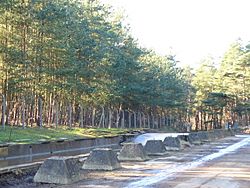Hogmoor Inclosure facts for kids
| Site of Special Scientific Interest | |

Tank crossing at Hogmoor Inclosure
|
|
| Area of Search | Hampshire |
|---|---|
| Coordinates | 51°06′31″N 0°52′29″W / 51.108480°N 0.874640°W |
| Interest | Army |
| Area | 768 ha (1,900 acres) |
| Notification | 1889 |
Hogmoor Inclosure is a large area of wooded heath in Hampshire, England. It is about 0.5 miles (0.8 km) west of the town of Bordon. This area is part of the civil parish of Whitehill.
The inclosure is used by the army for training. You can see many tank crossings scattered around the area. This place is famous for its long history with the British Army. There are large army barracks nearby. The Highland Light Infantry first explored the inclosure in 1896. Army camps were built here starting in 1903.
History of Hogmoor Inclosure
Before Bordon became an army camp, the land around Whitehill and Greatham was mostly woodland. This large forest is now known as Woolmer Forest. An old Roman road once passed through Hogmoor Inclosure. This road led to Longmoor and the Longmoor Military Camp. Today, part of it is still called Longmoor Road.
The inclosure began being used as an army camp in 1903. It is still used by the British Army and the Longmoor Army Ranges today. The Somersetshire Light Infantry used the camp in 1904. They had just returned from the Second Boer War.
In 2010, the town of Bordon decided to become an "Eco Town." This meant changes for the army training areas. The Ministry of Defence decided to move army training. It moved from Hogmoor Inclosure to St Athan in South Wales. This change means the 768-acre inclosure might be used for other things in the future.

